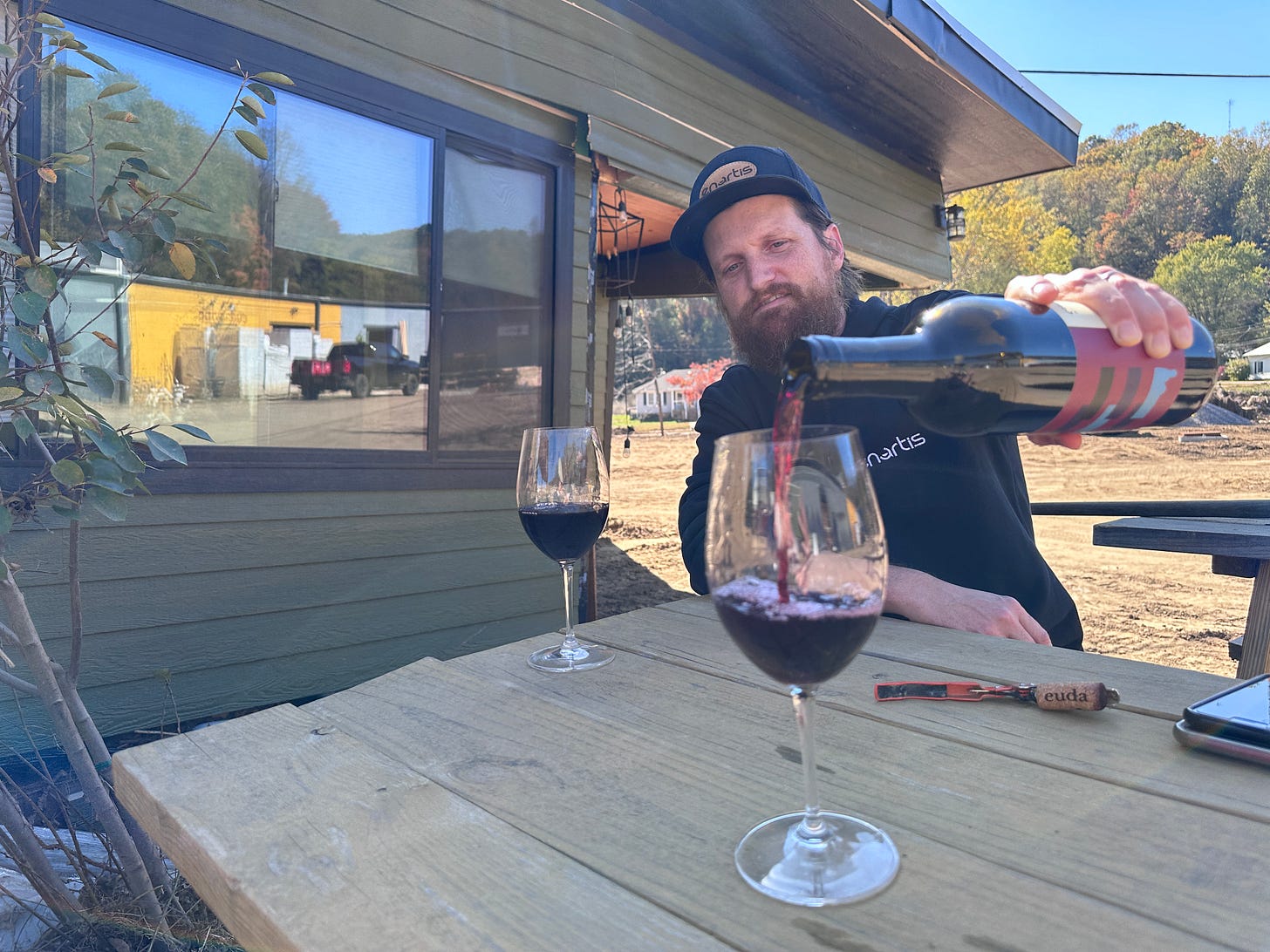The Strange Business Of Selling Wine After A Disaster
A conversation with Michael McGeary of Euda Wine on October 23rd, 4 weeks after the flood.
On September 27th, Hurricane Helene sent devastating floodwaters through Western North Carolina. In Old Fort, N.C., Mill Creek rose in a flash flood, sending three feet of water into Michael and Abi McGeary’s winery, Euda Wine. A few tanks of fruit from the recent harvest were swept away, but several remained—and many bottles were able to be salvaged.
Across the street from the winery, an Airbnb that sat on stilts at the bank of Mill Creek floated into the parking lot and cracked open, exposing a perfectly made bed of white sheets. Four weeks after the flood, I sat down with Michael at one of his picnic tables in the shade of the house, sharing a bottle of Cabernet Sauvignon.
We talked about transitioning out of the donation economy that was instituted organically throughout the region, the complicated experience of accepting help as a wine business, and the realities of making sustainable wine in North Carolina.
M: I have no problem with the house still being here as far as what needs to get done in the town work right now. Obviously as a business, we need the house to move. But to me it’s just more of an example of what needs to get done—that there’s still a house sitting in front of our building. It just goes to show how messed up everything is right now.
K: It’s a mindfuck that we’re sitting in the “front yard” of this house now. Just walking up to your business, the flipped picnic tables and the trees changing and the moon in the sky as I was walking up—it’s very strange to be here right now.
M: Truly. I feel it’s still strange every day I come in. I took a couple of days off just to not leave our house, which, that’s more normal. Our road is fucked up but our house is fine. So to be at our house for a few days, you sort of forget a bit, and then you come up and it’s like “oh yeah everything’s really fucked up”.
K: Where I live, there’s almost no sign this has happened there. And I’m reluctant to tell people that, it’s kind of a survivor's guilt thing. I feel like I’m in a cartoon and I’m standing in this house and the walls came loose and the doorframe went over my head and now I’m just standing there, unscathed.
M: It’s almost weirder now than it was at first. At first, it was like adrenaline or something; you’re just like, we have to fix this. We gotta shovel mud, we gotta cut drywall, we gotta get everything out of the building to dry it out. But then four weeks in you’re sort of like: oh I’m still in this weird world. Like—there’s no exit from this world (laughs).
K: Right. And the world is only going to become more…at first it sounds very primal like: save people, get the mud out. And then it’s more: integrate back into capitalism.
M: Totally.
K: And that’s disturbing because this situation doesn’t fit into that formula. Like what has happened doesn’t fit into that. You having to pay rent with a house in your…
M: So for instance, we as a town—all the businesses—have been meeting every Sunday. Part of it is social, we have beer. Part of it is setting up plans to help people and something we’ve talked about has been that there are businesses that are physically unaffected by what just happened. Like just down the road there’s a great coffee shop and a country store. For the last couple of weeks, they’ve been giving out free coffee, PJ’s Breadworks has been giving out free bread. But for better or for worse, part of the normalcy is businesses operating like normal. Like whether it’s the best world or not, we have to start recovering from it. How do you know, if you’re one of those businesses, when to start charging people again? Knowing that our town is hurting? Where many people have had damage or lost their jobs, knowing that 1) they need to get money but also 2) from a town standpoint, it’s nice to go buy coffee in a way.
So a lot of it has been this suggested donation approach like, if you need a free cup of coffee you can get a free cup of coffee, and if you can buy a cup then you buy a cup. I don’t think it’s going to be a perfect landing but how do you transition into that?
Keep reading with a 7-day free trial
Subscribe to Wine Is Confusing to keep reading this post and get 7 days of free access to the full post archives.





